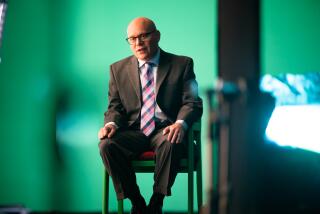‘One Child Nation’ finds victims on all sides of China’s restrictive policy
- Share via
Although she was born in 1985 while China’s severely restrictive one-child policy was in effect, Nanfu Wang notes she never questioned it much. The policy was introduced in 1980 with the mandate to limit couples to a single child as a way to control population growth. Shortly after it ended in 2015, someone asked Wang how the policy had affected her.
“I didn’t think it affected me at all, because I had a younger brother,” recalled the filmmaker, whose parents were allowed a second child because they lived in a less-populated rural area of Jiangxi province. “Looking back, I was shocked I was thinking that way.”
In the documentary “One Child Nation” — co-directed with Jialing Zhang, another child of the era and likewise an alumna of New York University’s journalism school — Wang examines that past as she travels home several times in 2017 and 2018, with all that unexplored history made even more personally relevant by the birth of her own child. “While making the film, it’s me trying to understand what I was taught and learned, and then unlearning it,” she said.
Much of what Wang discovers is profoundly tragic: compulsory abortions that ended illegal pregnancies and forced sterilizations. Babies, often female newborns cast aside so couples could try again for a male child under the quota, were left for compassionate strangers — or profiteering child traffickers — to claim, if they didn’t die first.
In Wang’s family, an aunt had to give up her daughter for adoption. An uncle abandoned his infant daughter. Among an array of other subjects, Wang also meets the midwife in her family’s village who seeks redemption for all the state-mandated abortions she performed. She now works exclusively with patients who are infertile.
Throughout, Wang maintains a first-person perspective that makes her central to the story she tells. That feels essential, connecting the personal to the historical in a way that emotionally grounds the film’s often disturbing details.
One of Wang’s biggest challenges was interviewing family members. “I originally thought my own family would be much easier than other people because of access and openness,” she said. “It turns out I had more obstacles on my side. Especially when I approached my uncle.”
The baby’s abandonment had not been discussed for decades, let alone with a member of a younger generation. Wang let several opportunities pass before she finally got her uncle on camera. “It took me a lot of courage to even ask them to sit down with me,” she said.
On the other hand, Wang was surprised at the openness of the former officials charged with carrying out the punitive policy that she meets in the film. “They wanted to talk. They had so much experience. The policy had bothered them throughout their life, so they were eager to express.”
The interviews led the filmmakers to shift their direction a bit. “We thought there would be perpetrators and victims who are on different sides of the policy, but once we started meeting people, we realized they were as equally traumatized as the women who were forced to have abortions.”
That realization helped Wang and Zhang deepen the moral shadings of their movie, which won the grand jury prizes at the Sundance Film Festival and the Full Frame Documentary Film Festival. “That made us realize these are all people that are victimized to some extent by the policy,” Wang said. “I was very curious what made good people do evil things, so I wanted to explore more of the psychology behind their actions.”
Making the film for Wang was akin to a therapist’s visit. “I was constantly trying to remember very distant memories of growing up and analyzing where those memories and emotions come from,” she said. “Gradually, there would be revelations throughout the process.”
As a child, the filmmaker lived near a public market where infants were often left. “We would hear babies cry. I remember my parents having the conversation, ‘Oh, someone abandoned a baby again.’ The next morning … the villagers would surround that baby, jokingly discussing who this baby looked like and who the parents might be. It became such a common practice that as a child, even when I was a teenager, I had never thought about it or had opinions about it until I became a mother myself.”
As it addresses the drastic results of what happens when a government begins dictating what women can do with their own bodies, “One Child Nation” offers a disquieting parallel to the restrictive anti-abortion laws that have been legislated in various states across America.
“I especially came to an understanding of how propaganda works,” Wang said, “and how nationalism made a huge impact in manipulating people to do things that they wouldn’t normally do or even were against their own morality and self-interest.”
More to Read
Only good movies
Get the Indie Focus newsletter, Mark Olsen's weekly guide to the world of cinema.
You may occasionally receive promotional content from the Los Angeles Times.










